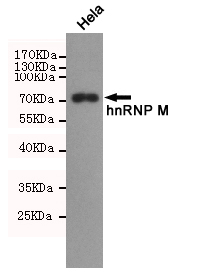-
Product Name
Anti-hnRNP M1-M4 Rabbit antibody
- Documents
-
Description
hnRNP M1-M4 Rabbit polyclonal antibody
-
Tested applications
WB
-
Species reactivity
Human, Mouse, Rat
-
Alternative names
CEA receptor;CEAR;Heterogeneous nuclear ribonucleoprotein M;hnRNP M;Hnrnpm;HNRNPM4;HNRPM;HNRPM_HUMAN;HNRPM4;HTGR1;N-acetylglucosamine receptor 1;NAGR1. antibody
-
Isotype
Rabbit IgG
-
Preparation
Antigen: CPAQNEKRKEKNIKR
-
Clonality
Polyclonal
-
Formulation
10mM PBS with 0.02% sodium azide 50% glycerol.
-
Storage instructions
Store at 4°C short term. Store at -20°C long term. Avoid freeze / thaw cycle.
-
Applications
WB: 1/500
-
Validations

Western blot analysis of extracts from Hela cell lysates using hnRNP M Rabbit pAb (1:500 diluted).Predicted band size:70kDa.Observed band size:70kDa.
-
Background
Swiss-Prot Acc.P52272.This gene belongs to the subfamily of ubiquitously expressed heterogeneous nuclear ribonucleoproteins (hnRNPs). The hnRNPs are RNA binding proteins and they complex with heterogeneous nuclear RNA (hnRNA). These proteins are associated with pre-mRNAs in the nucleus and appear to influence pre-mRNA processing and other aspects of mRNA metabolism and transport. While all of the hnRNPs are present in the nucleus, some seem to shuttle between the nucleus and the cytoplasm. The hnRNP proteins have distinct nucleic acid binding properties. The protein encoded by this gene has three repeats of quasi-RRM domains that bind to RNAs. This protein also constitutes a monomer of the N-acetylglucosamine-specific receptor which is postulated to trigger selective recycling of immature GlcNAc-bearing thyroglobulin molecules. Alternative splicing results in multiple transcript variants.
Related Products / Services
Please note: All products are "FOR RESEARCH USE ONLY AND ARE NOT INTENDED FOR DIAGNOSTIC OR THERAPEUTIC USE"
